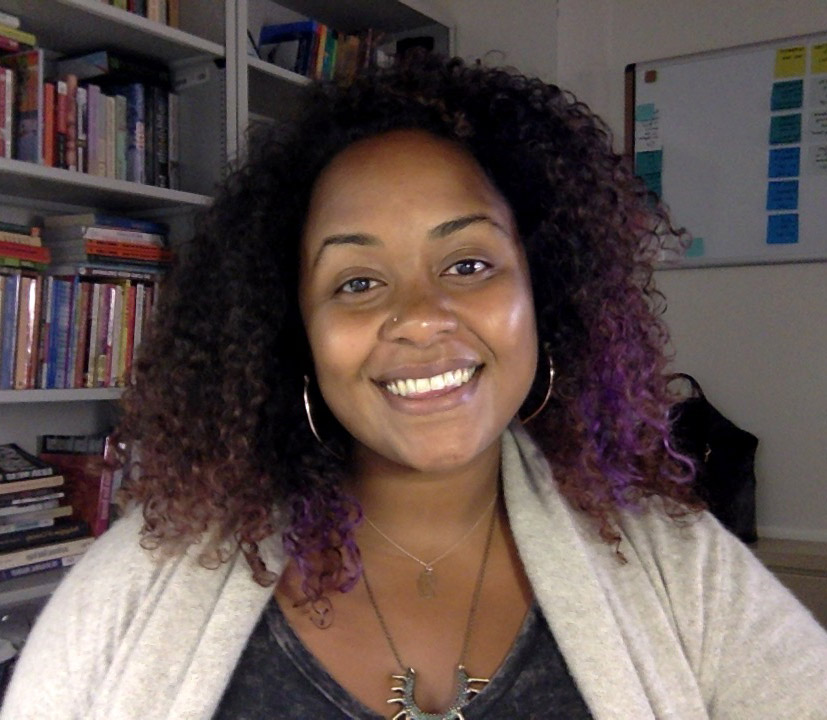Loading component...
Yomaira Figueroa is an associate professor in the Department of English in the College of Arts and Letters. Figueroa works on 20th century U.S. Latinx Caribbean, Afro-Latinx and Afro-Hispanic literature and culture.
I am not a big deal because I got a Ph.D. I’m just the girl you can call when you have a question that I might be able to answer. That’s how I see myself. I was able to take a different path that isn’t afforded to everyone.
My dad was orphaned at a young age. He finished third grade and then had to work. My mom, she finished the eighth grade.
Both on the teaching side and admin side, my first-gen experience is an important one. Without our perspectives, the university would continue to perpetuate a perspective of knowledge that is not inclusive or transformative.
In high school, I worked about 40 hours a week at a coffee shop. I am the child of working-class parents who are immigrant citizens. Spanish is our native language and our cultural identity was always of primary importance to our family and community.
Where are you from?
I was raised in Hoboken, New Jersey.
No, where are you REALLY from?
To be Puerto Rican, is never to be viewed as fully American. To be Puerto Rican automatically puts us in the unique position of otherness. As U.S. citizens and colonial subjects, we have a vexed relationship with the U.S. and its history in our archipelago.
My two brothers, sister and I were raised in a small three-room tenement, surrounded by other poor people where our situation wasn’t so unusual.
More than anything, families like mine wanted their kids to finish high school. My parents appreciated education — respected it, but their understanding of what it was, what it could mean — was limited.
My interest in college was met with mostly confusion. An uneasiness. It’s not that my parents discouraged me. They just didn’t really get it. Why would I want to do this thing that was meant for other people?
And, to be honest, I went through much of my first year of college thinking that maybe this was something other people do. People who don’t look like me. Talk like me. Walk like me.
My family didn’t even own a car. So on move-in day, my dad had asked his friend to drive us with all my belongings to Rutgers University, where I completed my undergraduate degree. When we arrived, they helped me unload everything onto the sidewalk. And then they left.
Standing outside the all-women’s dorm with my typewriter (yes, a typewriter in 2002!), clothes, laundry basket and whatnot, I realized, this would be the beginning of my aloneness.
Race and class were the easy markers of how I was different than most of the people I knew that first year, but there are these other things you can’t see and name. There’s this degree of knowing that comes more easily for those who have access to resources, preparation and quality education. And, for those who don’t — there’s the not knowing. Plus, I always worked two or three jobs as a student and helped my parents financially at home; it was just a different set of responsibilities.
We are so used to the hustle of having to do so much — carry so much weight — that we are unfamiliar with the behaviors that come with privilege. It’s really easy to burn yourself out at every level because of that feeling of needing to constantly do more, prove yourself and excel. It shouldn’t be that way, but it is.
I started to get out more, go to campus events and join organizations and met other first-generation college students and people of color. When I stepped out of my dorm and into the larger campus life, I found people who were doing things that mattered to me. I started to work as a medical interpreter, to volunteer at the local elementary school, to advocate to change the things I understood intimately — inequality and other systems of oppression that limit access for working class folks and people of color.
When I started doing this community work, I felt like, “Okay, people like me do belong here in college.”
My nephew is now at Dartmouth working on his Master’s. I hear my former self in him when he shares his observations of what it’s like to be a first-generation college student and how hard he is working, and I know there’s still more work to be done.
